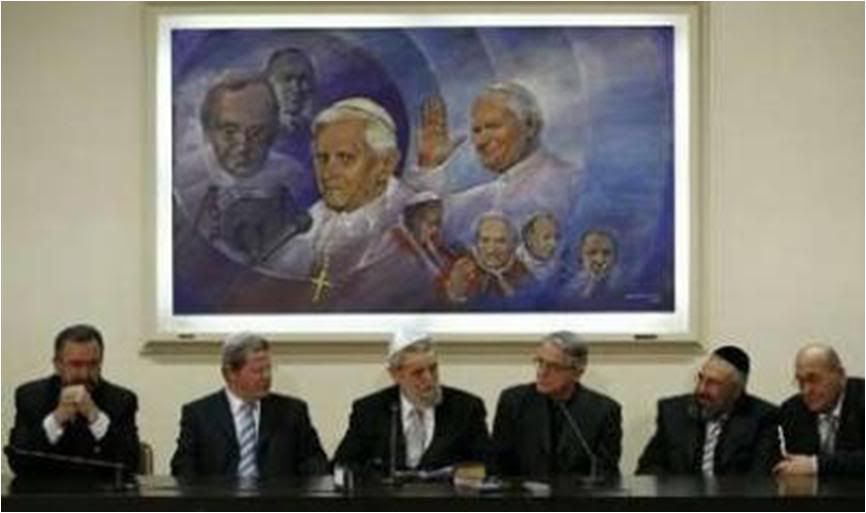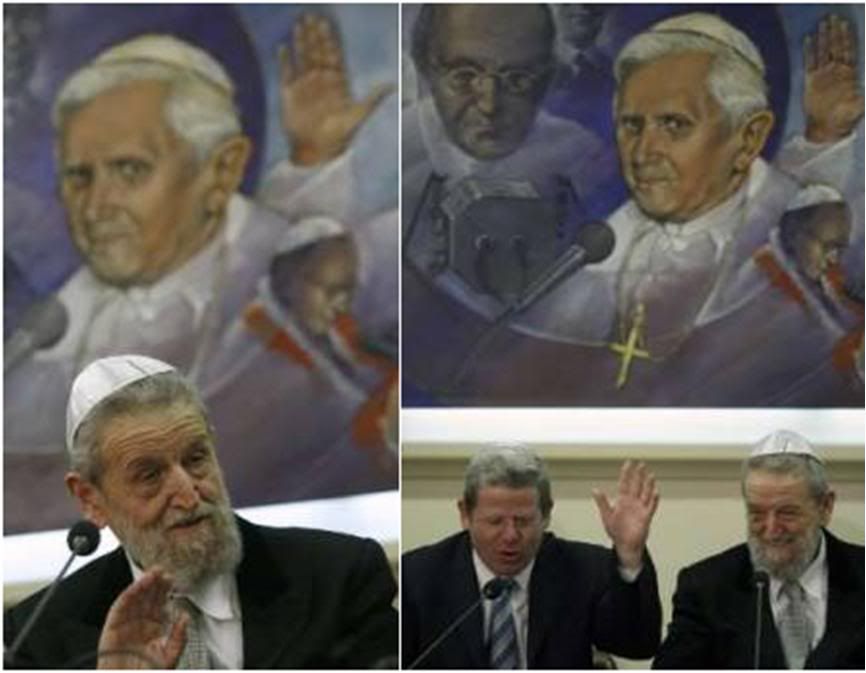
I was just getting set to translate a bunch of snippets from Italian news agencies on the Holy Fahter's meeting today with a delegation from the Grand
Rabbinate of Israel, from statements made by the rabbis at a news conference held afterwards at Vatican Radio headquarters [whose papal mural makes
a great background for any newscon held there!

But dpa has come up with a good round-up that also includes its report on the Pope's letter, which has a surprisingly good lead that does not follow
the MSM herd mentality for a change!
Pope 'saddened' by attacks,
thanks 'Jewish friends'
By Peter Mayer

Vatican City, March 12 (dpa) - In an unusually strongly-worded letter, Pope Benedict XVI has admitted that the Vatican made mistakes in efforts to reinstate four ultra-traditionalist bishops, while saying he was "saddened" by Catholics who attacked him over the issue.
At the same time, he thanked "Jewish friends" for their support in the matter.
The March 10 letter by the German-born pontiff to Roman Catholic bishops was made public by the Vatican on Thursday in six languages.
It also came on the day in which Benedict received a top-level delegation of Israeli rabbis who had initially threatened to cut links with the Vatican over views on the Holocaust held by one of the ultra-traditionalist clerics, British-born Bishop Richard Williamson.
In the letter, Benedict also provided a spirited defence of his decision in January to lift excommunication orders issued in 1988 against the four bishops of the Society of Saint Pius X (SSPX).
He "deeply deplored" that his "discreet gesture of mercy" was seen as "the repudiation of reconciliation between Christian and Jews," because of Williamson's remarks on the Holocaust.
Williamson, in a television interview broadcast around the time the excommunications were lifted, denied the scale of the Holocaust, saying he believed the Nazis had not used gas to kill Jews.
A row ensued with many Jews, but also Catholics and government officials, including German Chancellor Angela Merkel, demanding an explanation.
The Vatican subsequently said it was not aware of Williamson's views, but critics have pointed out that remarks written by the bishop in which he cast doubt on the historical veracity of the Holocaust have been available on the internet for some time.
Benedict, in the letter, acknowledged this, writing: "I have learned the lesson that in the future in the Holy See we will have to pay greater attention to that source of news (the internet)."
"Another mistake, which I deeply regret, is the fact that the extent and limits of the provision of 21 January 2009 were not clearly and adequately explained at the moment of its publication," Benedict said referring to the lifting of the excommunication orders.
Still, the Pontiff said he was saddened by the "open hostility" which some Catholics, who should have known better, had shown him.
"Precisely for this reason I thank all the more our Jewish friends, who quickly helped to clear up the misunderstanding and to restore the atmosphere of friendship and trust which - as in the days of Pope John Paul II - has also existed throughout my pontificate and, thank God, continues to exist," Benedict wrote.
On Thursday, the US-based World Jewish Congress (WJC), which had initially led some of the criticism levelled at the Vatican over the Williamson affair, praised Benedict in a statement.
The Pontiff's letter "conveys the essential requirements for inter-religious dialogue: candour and the willingness to tackle difficult issues squarely, " WJC President Ronald Lauder said. statement.
Last month the WJC and other Jewish representative bodies welcomed a Vatican demand that Williamson repudiate his Holocaust claims, as well as statements from Benedict deploring denial of the Holocaust.
Since then, ties have improved further with an announcement that Benedict will visit Israel in May, a point stressed on Thursday by Israel's Chief Rabbi Shear-Yashuv Cohen during an audience with the pontiff.
 Rabbi Cohen at the news conference after the meeting with the Pope; in the right photo, with Oded Wiener, secretary-general of Israel's Grand Rabbinate..
Rabbi Cohen at the news conference after the meeting with the Pope; in the right photo, with Oded Wiener, secretary-general of Israel's Grand Rabbinate..
The meeting marked a "turning point in the renewal of dialogue between us," Cohen, who in the immediate wake of the Williamson controversy had suspended contacts with the Vatican, told Benedict.
Cohen also urged the Pontiff to make the history of the Holocaust a "required" teaching subject in Catholic schools worldwide to reinforce what he said was the pontiff's declaring anti-Semitism as a "sin against God."
Benedict devoted the final and longest portion of the letter to explaining in detail the reasoning behind his overtures to the four dissident bishops and the SSPX.
He recalled how the SSPX's rift with mainstream Catholicism came about when, in 1988, Archbishop Marcel Lefebvre, a critic of the 1960s reform process known as the Second Vatican Council, consecrated the four bishops without a papal mandate.
The SSPX still does not enjoy canonical status within the church and its ministers "do not exercise legitimate ministries," unless there is an acceptance of the Second Vatican Council.
Among the reforms was the replacing of the Latin Rite Mass with services in local languages, and a commitment to improved relations between Catholic and Jews.
"The Church's teaching authority cannot be frozen in the year 1962 - this must be quite clear to the Society," Benedict said of SSPX strict adherence to pre-Council traditions.
But he justified his decision to lift the excommunications, saying they formed part of the mission of his pontificate: "the unity of all believers," and that working for a return of those Catholics represented by SSPX to the mainstream Church, formed part of this.
"Can we be totally indifferent about a community which has 491 priests, 215 seminarians, 6 seminaries, 88 schools, 2 university- level institutes, 117 religious brothers, 164 religious sisters and thousands of lay faithful? Should we casually let them drift farther from the Church?" Benedict asked in the letter.
World Jewish Congress praises
Pope Benedict's letter to bishops

March 12, 2009
Ronald S. Lauder, president of the World Jewish Congress (WJC), praised Pope Benedict XVI for issuing a personal letter to Catholic bishops explaining the circumstances of the Williamson affair.
"The Pope has found clear and unequivocal words regarding Bishop Williamson's Holocaust denial, and he deserves praise for admitting that mistakes were made within the Vatican in the handling of this affair," Lauder said.
"The pope's letter conveys the essential requirements for inter-religious dialogue: candor and the willingness to tackle difficult issues squarely. His expressed anguish at the events following the Holocaust-denying statements by Williamson reflects the similar emotional pain felt by Jews worldwide during this affair," he continued.
"We reciprocate his words of appreciation for Jewish efforts to restore inter-religious dialogue and will continue to work with the Catholic Church to further strengthen mutual understanding and respect," the WJC president stated.